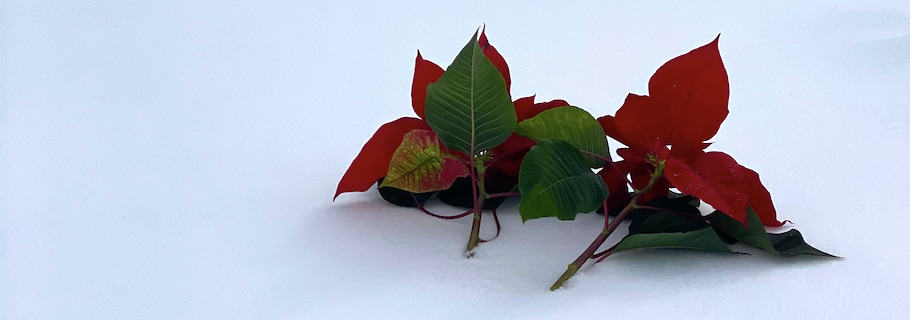We went to visit Nick on Christmas morning. “Visit Nick”—that’s what we’ve decided to call it when we spend time at his graveside. “Going to the cemetery” focuses on the place, not the person, so is too impersonal, too abstract. “Paying our respects” is another option, but sounds too formal to describe going to the place where our son’s body lies. So we “visit Nick,” just like we did on Christmas morning.
We sleep in for a while, then eat breakfast, then open gifts. To this point it has been just like every other Christmas for the past 20 years, save for his absence. Now, with those well-worn traditions behind us, we have entered into that lull between our morning routine and our Christmas dinner. And so, rather spontaneously, we don our coats and boots, our hats and mitts, and make the short drive.
Snow has blanketed the town—it began after nightfall on Christmas Eve and ended just as dawn was breaking on Christmas morning. It covers the ground, of course, but also every roof and every car. It clings to every branch of every tree. It is the most pristinely white Christmas we have ever witnessed. It’s a special blessing that’s breathtaking in its beauty.
As we arrive at the cemetery we see we are not the only ones to visit a loved one today. Tracks lead from the roadway to this grave and that one, sometimes a single, distinct set of bootprints in the snow, sometimes a jumble of little ones and big ones together. Some have left cards or laid wreaths or lit candles. One has carefully cleared a plot, leaving a rectangular patch of dormant winter grass standing stark against the surrounding snow.
We blaze a fresh path to the farthest grave, the newest grave, the one that has been there so short a time it does not yet have a monument or even a marker. The thick blanket of snow makes it impossible to see the disturbance where a hole has been dug and imperfectly refilled. But we know the spot.
We stand for a few moments, arm-in-arm, tears trickling down our cheeks and splashing to the snow. We try to talk, but what is there to say? I had thought I might pray, to thank God for the precious gift he gave us in so fine a man, so loyal a son, so committed a Christian. But now that it comes to it, I have no words. When I try to open my mouth little escapes beyond broken sobs. But I’m confident that God hears the prayers I cannot speak. He knows what it is to lose a son.
We have brought a present of sorts—sprigs of the poinsettia that for the past few weeks has brought its wintery cheer to our living room. We kneel beside the grave and place our gifts carefully on the undisturbed snow. They’ve come from the warmth of our home to the chill of this place. Their little splashes of bright red and green are set against the blinding brilliance of the snow. It isn’t much, but it’s something. It’s from our home. It’s from our hearts.
We think of our son and our God-given calling to raise him in the discipline and instruction of the Lord. We think of the tiny baby we carried home on a fine March morning so long ago. We think of the boy who awoke to the perilous state of his soul and put his faith in Jesus Christ. We think of the teenager who became so kind, so humble, so committed a Christian. We think of the young man who ran his short race so very well. “We did what God called us to do,” I whisper. “By grace,” Aileen replies.
Our hearts smile, even if our faces do not. We turn and retrace our tracks back to the roadway, back to the van, back to Christmas. We’ve added a new tradition to all our old ones.










